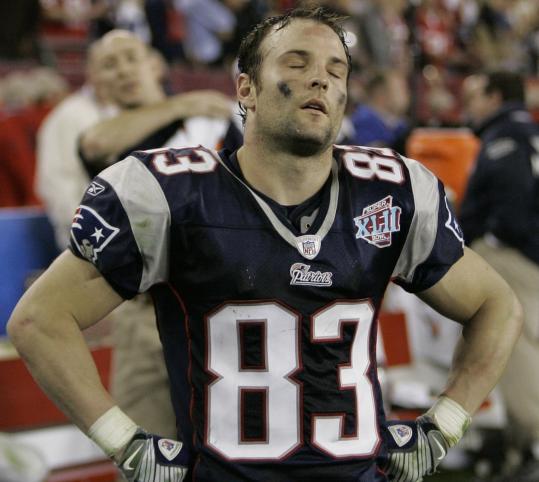The New England Patriots, the class of the NFL for the past decade, have just made a mistake that will be sure to have lasting ramifications. On March 13, they offered their star wide receiver Wes Welker a contract extension that was insultingly below market value (two years for $10 million) and basically showed him the door. Within a day, the Denver Broncos, the Patriots’ top AFC competitor, swooped in and signed Welker to a bargain deal (two years for $12 million, plus incentives). Next year, the Broncos’ four time NFL MVP Peyton Manning will be throwing not only to his big targets Demaryius Thomas and Eric Decker on the outside, but also Welker across the middle. Teams will only dream of finding a way to stop this offense.
Although the Patriots immediately responded by signing a slot receiver in Danny Amendola (five years for $31 million), they lost Tom Brady’s favorite target and a key piece of their offense. Despite the magnitude of this move, it is unsurprising and falls in line with a history of emotionless, arguable arrogant contract negotiations. Belichick is known to show no preference for players even if they have partially defined the Patriots dynasty. However, this one seemed a little differnt. Welker may not be as talented as other top receivers, but he’s worth more to Brady and the Patriots than the $10 million offered to him. By signing with Denver, Welker shifted the balance of power in the AFC from the Patriots to the Broncos.
The Pats have achieved an almost mythical level of dominance since Tom Brady’s meteoric rise in 2001, but it has been due largely to excellent coaching and shrewd personnel management. Although much of the credit should go to Tom Brady–the 2nd greatest quarterback of all-time behind Joe Montana–Bill Belichick’s iron-fisted personnel decisions deserve their just reward. New Englans achieved its success by making tough roster decisions, constantly building the team for the future instead of rewarding players for their past achievements. Belichick’s strategy has worked for years, trading veteran players for high draft picks and stockpiling a roster full of young, often unsung talent. For example, in 2006, the Patriots chose not to pay their top wide receiver Deion Branch his market vale and traded him to the Seattle Seahawks for a 1st round pick in the 2007 NFL Draft. Branch was a bust for the Seahawks and returned to the Patriots in 2010 for a 4th round pick.
Although thethe strategy of leaving emotion and loyalty at the door has worked for years, recent decisions have been less successful. In 2009, they traded their best defender and locker room leader Richard Seymour to the Oakland Raiders for a 1st round pick in the 2011 NFL Draft. Their once-stellar defense dropped off significantly and has yet to recover. It marked an organizational shift. The Pats of the first half of 2000 made a living on defensive prowess. Brady picked his way down the field with out routs and slants, throwing for eight when he needed six. After the Seymour trade, the focus shifted to the offense. Essentially, the game plan has been: as long as Tom Brady and company can put up 40+ points per game, the Patriots will probably win–even if the defense gives up 35 every Sunday.
Brady and the Patriots both understood the new framework, and that was the main reason Brady just took an extremely cheap contract extension (along with the fact that he happens to have an independently wealthy spouse). He wanted the Patriots to use that extra money to ensure that the key parts of the offense remained with the team. Belichick and the rest of the Patriots’ management team responded to Brady’s gift to them by playing hardball with Wes Welker and forcing him out of town.
Despite the Welker loss, the Patriots are not done. In fact, I firmly believe that they will make the playoffs next year. As long as they have Brady under center, they remain a threat. But their window for winning another Super Bowl is closing fast and Tom Terrific is not getting any younger. In order for them to win it all, their offense must be firing on all cylinders. A passing game relies on chemistry between the quarterback and his receivers. I don’t care what the Patriots’ brass says: losing Brady’s favorite target and the NFL’s most productive receiver over the past six years (672 receptions in six seasons, five of six seasons with 100+ and 1000+ yards) hurts the offense more than helps it. Although they are still the Super Bowl favorites heading into next year, the Patriots will not win the Super Bowl.
Belichick has won in the past due in no small part to a system that promotes the interchangeability of personnel. It has been wildly successful and inspired many other teams to rethink thier philosphies, but in some cases, players trancend interchangability. Players like Welker and Seymour fit that bill. It’s true, the NFL is a business of winning not loyalty–fans can’t be GMs–as is any business, but in some cases, loyalty and winning come hand in hand. Belichick is sticking to his guns, sticking to the party line, but many are questioning if maybe, just this once, it would have paid to pay Welker a little more, just because.
-Zander Mrlik
Stat of the Day:














